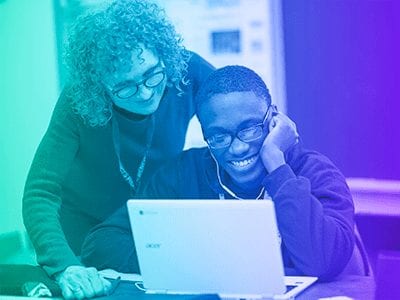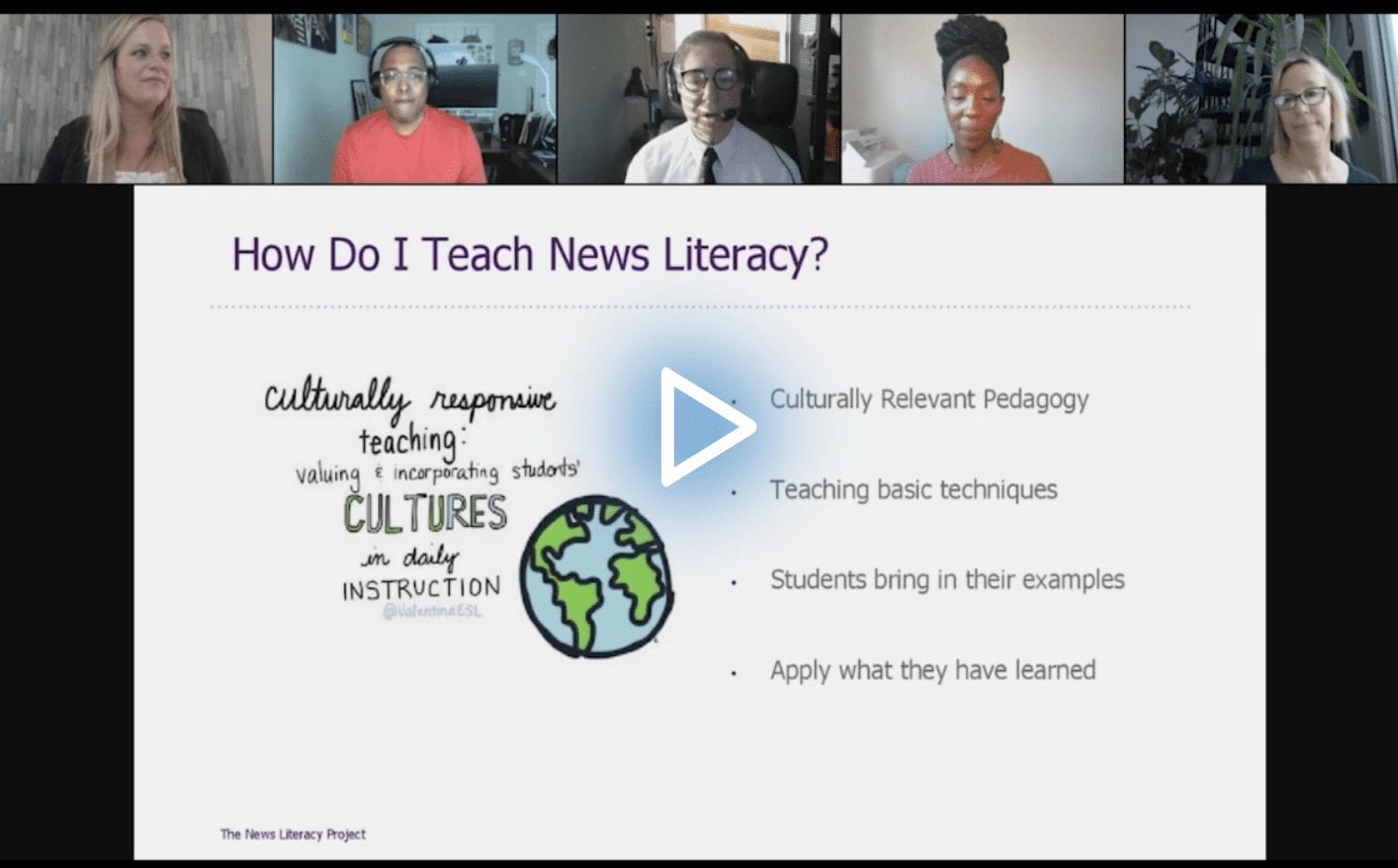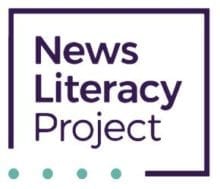Integrating Media Literacy with Project-Based Learning and a Culturally Relevant Pedagogy
By Robert Low
As controversies about the pandemic, climate change, and social justice continue to make headlines, these same topics also provide opportunities for students to learn and apply media literacy skills that will help them with their course work, personal lives, and civic engagement.
Ways to engage students in developing media literacy were recently discussed during an edWebinar, sponsored by the News Literacy Project, which featured Shaelynn Farnsworth, National Director of Educator Outreach and Success, and Ebonee Rice, Vice President, Educator Network. Presenting with them were Dr. Cathy Collins, a technology teacher and librarian at Sharon Middle School, Dr. James Stancil, Academic Support Specialist at Prairie View A&M University, and Jeff Kaufman, a computer science teacher at a Title 1 School.
As Shaelynn pointed out, today’s students are encountering the largest and most complex information landscape in human history, so helping students learn to navigate it successfully is an essential part of their education.
Defining and Developing Media Literacy
A key component of media literacy is being able to determine the credibility of information, as well as the credibility of its source. For this purpose, teaching the standards of authoritative, fact-based journalism provides a basis for students to evaluate how information is being presented, for what purpose, and by whom. Once students learn to do this routinely, they will be better able to separate fact from fiction, and differentiate information from opinion, unproven assertions, and conspiracy theories.
As part of the process, students should be taught to consider whether a news report contains multiple credible sources of information, whether the information can be verified, and how the information can be verified. Other important considerations are whether there is a balanced context for the information and an avoidance of bias. Being able to apply these standards across different types of media will enable students to become active and selective consumers of information, and help them understand the importance of a free and independent press.
As students grow older, their media literacy courses should increasingly include research, collaborative projects, and discussions that develop higher-order thinking skills that can be applied across the curriculum. These types of projects and skills will help prepare students to meet college-level expectations, qualify for well-paid careers, and make wise decisions regarding their personal and civic lives.
Integrating Project-Based Learning and a Culturally Responsive Pedagogy
Bringing students together to solve problems can lead to greater engagement while developing 21st century skills. Identifying questions and issues that are meaningful to students, and then helping the students find answers, can encourage the students to do online research, find and evaluate evidence, and then present and discuss proposed solutions. These types of collaborative projects can also be gamified and made competitive to further motivate teams of older students.
A systematic, project-based approach to media literacy should start with analysis and delineation of a problem, and the definition of key terms and issues. Students can then proceed to evaluate information, examine different perspectives, determine appropriate decisions, and discuss potential outcomes, including unintended consequences.
In addition to project-based learning, a culturally relevant pedagogy can include community-based learning in which students focus on issues that directly affect them, their family members, and other members of their community. This can include consideration of how local people and issues are presented in the news media, with students going beyond the headlines and doing research on underlying causes, potential government roles and solutions, and alternative viewpoints.
Local topics of interest to students may include climate change and other environmental issues, the impact of the pandemic, new technologies, and social or economic justice. Once a topic is selected, initial resources can be identified for further investigation and discussion, plans and procedures for the project can be outlined, and a rubric created for evaluating performance and results. There may also be opportunities to make the project cross curricular and engage other educators in the teaching and learning process.
Knowing such topics may be controversial and inspire a variety of strong views, educators need to model appropriate behavior and create a community of trust and fairness where students feel safe to express their views and respond to others’. There should also be a recognition that in many situations there is not just one right answer.
Educators should also be aware that administrators, parents, and other community members may have concerns about this type of project, but helping students develop media literacy is increasingly important in today’s challenging and fast-changing world.
This edWeb broadcast was sponsored by News Literacy Project.
About the Presenters
Shaelynn Farnsworth is the News Literacy Project’s National Director of Educator Outreach and Success. Shaelynn has over 20 years of experience in education. She spent the first part of her career as a high school English teacher in Conrad, Iowa, where she reimagined teaching and learning in her classroom and became a leader in the convergence between literacy and technology. Shaelynn focused on developing student skills in information consumption, creating innovative ways for students to demonstrate understanding, and inspiring healthy skepticism in the digital age. She was recruited by a regional state education agency in Iowa, where she was a school improvement consultant for seven years. Shaelynn supported districts throughout Iowa in the areas of literacy, technology, AIW, and systemic change. She was a member of the state’s literacy, social studies, and technology leadership teams.
Ebonee Rice joined the News Literacy Project (NLP) in April 2020 as Vice President of NLP’s Educator Network. A strategic coalition builder and community engagement expert, she has spent her career successfully scaling up campaigns and programs in the pursuit of equal access for all. From 2015 to 2017, she led the national partner engagement program at Enroll America, a nonprofit created to ensure that members of often-underserved communities were able to enroll for health insurance under the Affordable Care Act. Her work resulted in millions of people within minority, women and young adult communities gaining health coverage. After Enroll America closed its doors, she joined the District of Columbia’s Office of the State Superintendent of Education as a community outreach specialist, building compelling digital experiences for constituents that led to positive outcomes for children, educators and families.
Ebonee began her career as a marketing/outreach coordinator for the City of Los Angeles Department of Recreation and Parks and has also worked for Golden Girl Media, BET Networks and the International Black Women’s Public Policy Institute. A native of Los Angeles, she holds bachelor’s and master’s degrees in communication from the University of Southern California’s Annenberg School for Communication and Journalism.
Dr. Cathy Collins has worked as a library media and technology specialist for 23 years at the K-12 level. She is currently a technology teacher at Sharon Middle School, where she teaches engineering and design, 21st century media skills, and a hybrid science/history course called “Inventions Through Time.” She holds a Doctorate in Education with a specialization in curriculum, leadership, teaching and learning; and additional master’s degrees in education and library science. Dr. Collins served on the MassCUE Board as PD Chair from 2015-2019. She has published her writing in various journals including Education Week, Library Media Connection, NEA Today, and Knowledge Quest. She is a 2012 Reynolds High School Journalism Institute Fellow and served as a project consultant for the e-book, Searchlights and Sunglasses: Journalism in the Digital Age. She received a Teachers for Global Classrooms fellowship from the U.S. Department of State in 2014 and is the recipient of AASL’s Intellectual Freedom Award (2014). She was named an MSLA “Super Librarian” in 2015. She served on the MA State Science Ambassador Team and enjoys contributing to the ISTE STEM PLN Leadership Team efforts. She is passionate about STEM/STEAM and global education. In addition to coordinating the Chinese Exchange Program at Sharon High School, she has journeyed with her high school students to India, Peru and most recently Tanzania, Africa to contribute to global service-learning projects.
Dr. James Stancil works in academic support at Prairie View A&M University. He formed a 501(c)(3) organization, Intellect U Well, Inc., that promotes the joy of reading, media literacy, and digital citizenship in the Houston community. He also volunteers with 100 Black Men of Metropolitan Houston, which mentors young men, and with the Houston Network of Outdoor Afro, which seeks to reconnect local communities with nature and the outdoors.
Jeff Kaufman started his career as a New York City Police Officer. While serving the people of Brooklyn, he attended law school. After leaving police service, Jeff went into the private practice of law. There, he served on a panel as counsel for indigent defendants in criminal and civil matters. He became involved in education issues, and in the same precinct he once patrolled, was offered a position to start a paralegal program for inner-city high school students. His passion for education led him to Rikers Island where he joined the faculty of the jail’s educational facility teaching law to high school students facing trial for serious felony offenses. Jeff currently teaches in a Title I school in Far Rockaway, Queens, where, for the past six years, he founded and maintains a computer science program. His course provided the first Advanced Placement course at the school and the first computer science program on the Rockaway Peninsula. Jeff is committed to the constitutional protections guaranteed to a free press and incorporates these principles in his lessons. He looks forward to his new role as a News Literacy Project ambassador, where he will help to make the resources teachers and students need in their fight against misinformation accessible.
Join the Community
News Literacy is a free professional learning community on edWeb.net where educators work together to develop their students’ civic knowledge and critical thinking skills when consuming news and information.
The News Literacy Project is a nonpartisan national education nonprofit, provides programs and resources for educators and the public to teach, learn and share the abilities needed to be smart, active consumers of news and information and equal and engaged participants in a democracy.
Robert Low has more than 30 years of educational publishing experience, ranging from editing and product management to online advertising and content development. He also works with edWeb.net to write articles on their professional learning edWebinars.





Comments are closed.